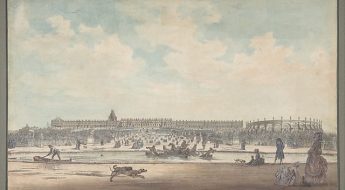Part 4.3 is the third part of Chapter 4.
A Childhood at Versailles consists of the first 5 chapters of the memoirs of Mme de Boigne (1781-1866), née Adèle d’Osmond, who was a French salon hostess and writer. She was born in the Château de Versailles and lived at the court of Louis XVI and Marie-Antoinette until her family fled to England during the Revolution. Later in her long life, she married a rich soldier of fortune 30 years her senior, hosted a brilliant salon in Paris, and became an intimate of the last French queen, Marie-Amélie, consort of King Louis Philippe (r. 1830-1848). Childless herself, Mme de Boigne addressed her memoirs to her grandnephew. The memoirs were not published until 1907, under the title Récits d’une tante, or An Aunt’s Tales. They’ve never been published in English, as far as I know, so I’ve decided to translate the first 5 chapters, the ones that take place mainly at Versailles, and post them here on this blog for interested readers to enjoy for free.
The chapters are quite lengthy, so I’ve broken each one into several parts. In Part 4.3, the author recounts her father’s role in the narrow escape of Mesdames, Louis XV’s aunts, from the mob.
A Childhood at Versailles, Chapter 4, Part 3 (4.3)
Far from calming down, the Revolution became ever more menacing. The King, who had formed the project of leaving Paris, wished to get his aunts away from it. They asked for and obtained the National Assembly’s permission to go to Rome. Before leaving, they went to stay at Bellevue.
My father had been named minister to St. Petersburg to replace M de Ségur (1790). The Minister’s public report had it that this choice had been made because the Empress Catherine would not consent to receive an envoy who was a patriot. This circumstance could not but render my father’s position very dangerous. Nevertheless, he did not think of leaving France, but he wanted his wife and daughter to leave. As soon as Mesdames had crossed the frontier, my mother was to follow them.
On the eve of the day fixed for Mesdames’ departure, my father, who spent his days among different groups, caught wind that many no longer wanted to let them leave. Demagogic orators preached a crusade against Bellevue, with a view to fetching the old ladies and bringing them back to Paris; one could never have too many hostages, etc. The obedient mob was already on the road to Bellevue.
My father quickly returned to the Tuileries and had his his valet, named Bermont, of whom I will have occasion to speak more, put his boots on. He took him to the Princesse de Tarente, who was living in the faubourg St. Germain and with whom he was closely connected, had one of her horses saddled, and sent Bermont by the Grenelle plain and the Meudon road to warn Mesdames that they had to leave forthwith.22
The orders for the departure had been given for four o’clock in the morning, but it was only ten o’clock in the evening. Mesdames’ people grumbled, for a large number of them would have preferred that the journey not take place. Bermont went to the stables, where no harnessing was being done. He came back to Madame Adélaïde, told her that there was not a moment to lose and that he himself had heard the cries of the column that was advancing on the other side of the Seine.
Mesdames finally consented to board M de Thiange’s carriage, which by chance happened to be in the courtyard. Their people finally made up their minds, and the traveling carriages set off. Hardly had the last one passed through the Meudon gate when the Sèvres gate was assailed by the mob. It was soon forced open and the mob entered the chateau, which was pillaged, but Mesdames had escaped the danger.23
Comte Louis de Narbonne was accused of having made them run that danger because, as Madame Adélaïde’s chevalier d’honneur, he should have accompanied them, but preferred to remain in Paris. My father always regarded this assertion as one of those absurd calumnies that party feeling invented against people who did not share its passions. In any case, my father was biased in favour of the Comte Louis; he loved him tenderly, the affection was mutual, and their political opinions scarcely disunited them. Comte Louis said: “I am d’Osmond’s shameful passion; vainly does he protest against it. As for me, I will never get accustomed to seeing him in the party of the stupid.” They rarely encountered each other, but when they did, it was always in a friendly spirit.
Mesdames were arrested on the road. Set at liberty by a decree of the National Assembly, they continued on their way. We started on ours, which passed without incident, and we rejoined Mesdames in Turin.
Notes:
22. 10 February, 1791. See, in the Pièces justificatives, Madame Victoire’s letter of 21 March, 1795.
23. See the important role played by the Comte de Virieu in this circumstance in the fine study dedicated to him by the Marquis de Costa de Beauregard of the Académie Française: The Romance of a Royalist in the Revolution, Vol I in onto, Plon et Cie, Paris, 1895, 3rd edition, p. 227.
Part 4.4, about the royal family’s flight to Varennes, will appear sometime between 4 and 7 June, 2018.


















Leave a Comment